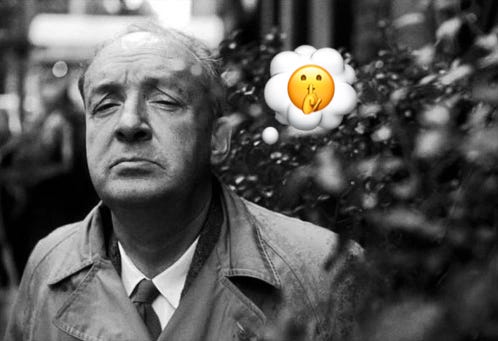Vladimir Nabokov hated jazz.
Or as the supremely eloquent author put it in a 1962 interview with the BBC, he endorsed the opinions of John Shade, his character in Pale Fire, who loathed jazz alongside such people, places, and things as “progressive schools, music in supermarkets, swimming pools, brutes, bores, class-conscious philistines, Freud, Marx, fake thinkers, puffed-up poets, frauds and sharks.”
Nabokov hated all music, to be fair, and he recognized this as a personal failing. He couldn’t appreciate the opera career of his son Dmitri, which he deemed “a special reason for finding my ignorance and inability so sad, so unjust.”
But it seems particularly appropriate that he didn’t understand jazz, the most improvised art form, because Nabokov never improvised.
In Strong Opinions, the brilliant 1973 collection of his interviews and letters to the editor, he makes abundantly clear that his elegant wit was the result of painstaking labour, to the point that every interview was conducted in writing and reproduced verbatim. He lamented his “inability to express myself properly in any language unless I compose every damned sentence in my bath, in my mind, at my desk.”
Even when he appeared to be speaking, he was reading. Before he began his academic career in the U.S., he carefully wrote out every lecture he would ever give, comprising hundreds of lessons “on great novelists from Jane Austen to James Joyce.” As he put it:
“Spontaneous eloquence seems to me a miracle. I have rewritten — often several times — every word I have ever published. My pencils outlast their erasers.”
I defined wit as “spontaneous creativity” in my book Elements of Wit, but I’ve since revised that definition to “surprising creativity.” Though Nabokov spurned the spur of the moment, his writing sparkles with a here-and-now cleverness. The imagery is arresting, because though he was raised as “a perfectly normal trilingual child in a home with a large library,” he had a mind that functioned outside the bounds of language:
“I think in images, and now and then a Russian phrase or an English phrase will form with the foam of the brainwave, but that’s about all.”
The best-known result of those brainwaves is of course a novel about a pedophile, part of a perceived penchant for perversity he denied to the BBC thusly:
“Some of my characters are, no doubt, pretty beastly, but I really don’t care, they are outside my inner self like the mournful monsters of a cathedral facade — demons placed there merely to show that they have been booted out. Actually, I’m a mild old gentleman who loathes cruelty.”
As to whether he qualified as an American author, this roundabout description of his stateside diet nicely answered the question:
“I became as stout as Cortez — mainly because I quit smoking and started to munch molasses candy instead, with the result that my weight went up from my usual 140 to a monumental and cheerful 200. In consequence, I am one-third American — good American flesh keeping me warm and safe.”
After moving back to Europe, he included this quip in a written interview with Life magazine:
“Of course I miss America — even Miss America.”
And finally, a hint that he viewed a lack of spontaneous eloquence as a feature, not a bug: In 1969, Esquire asked Nabokov what he would like to hear an astronaut say when landing on the moon for the first time. His cabled reply:
“I WANT A LUMP IN HIS THROAT TO OBSTRUCT THE WISECRACK.”
Quick quips; lightning
“His writing is not about something. It is the thing itself.”
— Samuel Beckett on James Joyce
“Vulgarity is a necessary part of a complete author’s equipment; and the clown is sometimes the best part of the circus.”
— George Bernard Shaw
“One forgets words as one forgets names. One’s vocabulary needs constant fertilization or it will die.”
— Evelyn Waugh
Speaking of…
Writing across languages
Playing without notes
Get Wit Quick No. 156 fulfills my “urge to garner bits of straw and fluff, and eat pebbles,” as per Nabokov’s description of his creative process. I only now recall that the longstanding “Quick quips; lightning” section of these newsletters is a riff on how Humbert Humbert parenthetically described the death of his “very photogenic mother”: (picnic, lightning.) “I think like a genius, I write like a distinguished author, and I speak like a child,” Vlad the detailer says in the foreword to Strong Opinions, a phrase Martin Amis memorably reversed to describe his pal Christopher Hitchens. Finally, V.N.’s morning routine: “shave, breakfast, enthroned meditation, and bath — in that order.” If anyone needs me, I’ll be revising Elements of Wit: Mastering The Art of Being Interesting. And remember: Never wear sunglasses shaped like the❤️ below, though do tap it.






Not a day goes by that I’m not amazed by these articles